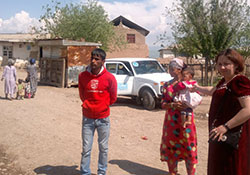High coverage reported in first rounds of polio immunization campaign in Tajikistan

WHO/Nargis Saparova
With over 90% coverage reported so far, a supplemental poliomyelitis (polio) immunization campaign initiated in Tajikistan in February 2014 is helping to protect the country from reimportation of the polio virus.
Following a WHO Regional Certification Committee recommendation made in 2013, and considering Tajikistan’s proximity to a polio-endemic country (Afghanistan), the Ministry of Health proposed supplementary oral polio vaccine (OPV) immunization for children aged 0–5 years to improve nationwide immunity against the polio virus. Upon the request of the Ministry of Health and WHO, 2.4 million doses of OPV were donated by the German Development Bank KFW in early 2014.
Implementation
Gorno Badakshan Autonomous Oblast (GBAO) conducted 2 rounds in February and early April 2014, with reported coverage of 94.6% and 98.9% respectively. The WHO Country Office in Tajikistan provided funds for the operational costs of the campaign in GBAO.
The first of 2 rounds in the remaining 4 oblasts (Dushanbe, RRP, Khatlon and Sugdh) for a target group of 1.1 million children was successfully implemented on 14–18 April 2014. The second round is planned for May 2014. Financial support was provided by the Global Polio Eradication Initiative (GPEI).
Fixed as well as mobile teams were used to reach the target children in townships, villages as well as in remote and geographically isolated areas in the country. The reported overall coverage of the first round was 98.7%.
Several social mobilization activities were conducted before and during the campaign to improve community participation.
- Numerous television and radio spots were broadcasted.
- Posters were displayed at the health centres where vaccination took place.
- Information materials were developed and disseminated to the community.
- Health workers were actively involved in information dissemination.
Monitoring
The WHO Country Office and the Ministry of Health are monitoring the campaign. The findings so far suggest that the campaign is well implemented and no major problems have been reported.



